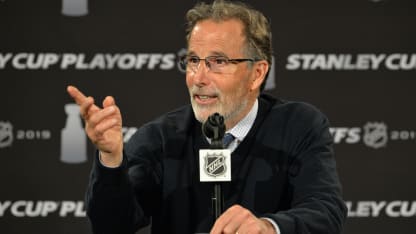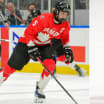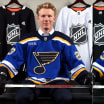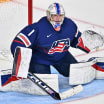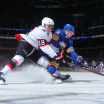And when it comes to culture building, getting players to buy into being hard away from the puck is one of the first steps.
"I think one of the most important attributes of a head coach is to find and teach the structure away from the puck," Tortorella said. "That's a huge part of winning, as you see in the playoffs right now, as you listen to some of the players talking about it in the playoffs right now. It's a huge part of being who you want to be and I think it really develops a standard of being a hard team to play against.
"Bottom line is, I want the team to be hard. I think we need to present ourselves, look harder coming off the bus, coming into buildings. I want other teams to say, 'You know what? We got our hands full tonight.' All the things that come with that starts with teaching play away from the puck. And we'll go through some experiences as you go through it and that's when you start becoming who you are. And the trick for the coaching staff is to get individuals to do that and then you get them to join in as a team.
"And that's when you have a group of men that you know when you go in that locker room, there's belief and there's some hardness. We've got to get some skin. We've got to grow some skin. And it goes through a lot of these different experiences that we'll go through as we start our camp."
Though a lot of attention will be paid to defensive improvement, Tortorella said he wants his skill players to play to their ability.
"It needs to be a two-way street," he said. "Just show me that you're willing to give us something away from the puck. I'm not going to turn you into a checker, but you've got to show me, and more importantly show your teammates, that you're willing to do some of the other stuff as an offensive guy away from the puck.
"Then you have something, and I think that's what develops the right camaraderie of a hockey club, and it develops the right attitude of a hockey club and how hard you have to be. I think it starts with your top guys."
Among them is forward Cam Atkinson, who was second on the Flyers with 50 points (23 goals, 27 assists) in 73 games this season. The 33-year-old averaged 25.6 goals and 48.3 points during Tortorella's tenure with the Blue Jackets, including 41 goals, 28 assists and 69 points, each an NHL career-high, in 2018-19.
"When I first came, Cam was stubborn," Tortorella said. "And I like his stubbornness, I think players of that quality, of what he has to do at the size that he is (5-foot-8, 176 pounds), and what he has to do as a player in the National Hockey League and be a top-notch player like he is, you've got to have that stubbornness. ... I look at that guy now and what he's become, how hard he plays, how he's grown as a leader and has grown as a person. I'm very fortunate to have spent some time with him. I relied on him in Columbus."
Tortorella said he already has spoken to some of his new players and will continue those conversations during the offseason.
"I think the No. 1 responsibility for me here is to listen, to meet the players ... understand them a little bit [and] I think it takes a little time for the players to understand me," he said.
The communication skills and experience are some of the things that put Tortorella at the top of the Flyers list after Mike Yeo was fired May 3.
Tortorella, who worked as an analyst with ESPN this season, has won 673 games, 14th in NHL history, and second among United States-born coaches after Peter Laviolette (717). In 20 seasons with the New York Rangers, Tampa Bay Lightning, Vancouver Canucks and Columbus Blue Jackets, his teams made the playoffs 12 times. He is a two-time winner of the Jack Adams Award, voted as NHL coach of the year, led the Lightning to the Stanley Cup in 2004 and the Blue Jackets to their first playoff series win, against Tampa Bay in 2019.
Tortorella has a reputation for being a demanding coach, and doesn't back away from that description. But Fletcher said it's the message Tortorella delivered that resonated with him.
"I think deep down there are a lot of demanding coaches in the NHL, but ultimately players will respond if they know you're demanding but you're demanding in a sense that you care about them," Flyers general manager Chuck Fletcher said. "You want what's best for them and you're not being demanding for yourself, you're being demanding to make the player better, to make the team better. And nobody personifies that more than John Tortorella."
